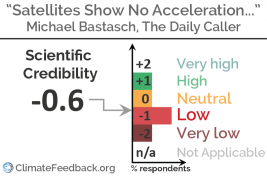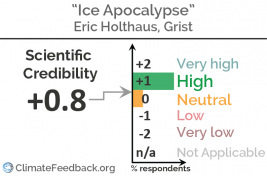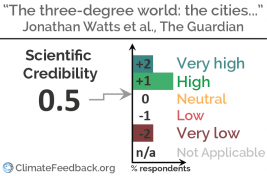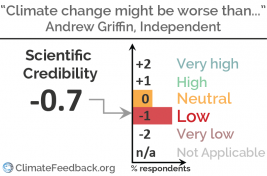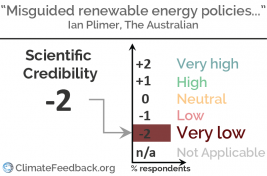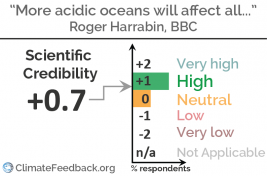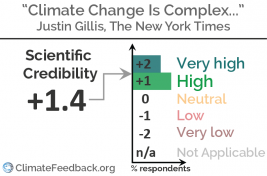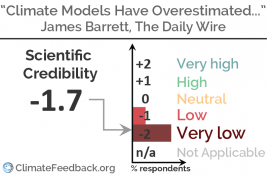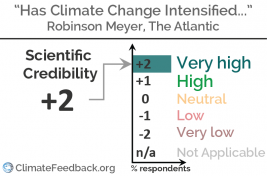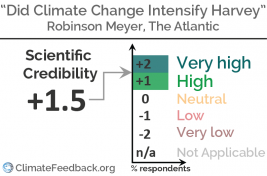Article Reviews
“Is this article consistent with the latest thinking and knowledge in science?”
“Would experts in this field endorse the main message of this article?”
These are the types of questions our “feedbacks” are designed to answer. If the feedback is positive, you can generally assume the information you’re reading is of high credibility. If it’s negative, however, you may want to read with extra care and attention — some of the information contained and conclusions reached are not consistent with science.[1]
Daily Caller uncritically reports poorly supported conclusion of satellite temperature study
in The Daily Caller, by Michael Bastasch
"The absence of accelerating warming trends is meant to go against prevailing climate science, but I find that to be a strawman argument. In that sense the article is misleading—however, to its credit, it does report on other published results that contradict this recent study, but it fails to provide further context or to make any effort to compare/reconcile the validity of these different studies."
— 04 Dec 2017
Grist article on an “Ice Apocalypse” mostly accurate, but doesn’t make the likelihood of that apocalypse clear enough to readers
in Grist, by Eric Holthaus
"The article has a bias, emphasizing the high end scenarios of ice sheet behavior, avoiding scrutiny of model assumptions. The concept of marine ice cliff instability and how unusual it is as a mechanism today on the vast coastline of Antarctica or Greenland is ignored."
— 28 Nov 2017
Guardian explores sea level rise impact on cities, but fails to make timescale clear
in The Guardian, by Jonathan Watts, Dom Phillips, Helen Roxburgh, Josh Holder, Justin McCurry, Niko Kommenda, Richard Luscombe, & Ruth Michaelson
"This article provides an excellent visual of an unfortunately very likely general future for humanity, in which sea level rise slowly inundates many coastal cities ... However, one major drawback of this article is that the magnitude and timescale of the sea level rises described in this report are not well explained."
— 09 Nov 2017
The Independent makes a giant leap in stating that modern global warming could be “worse than thought” based on a single study
in The Independent, by Andrew Griffin
"The article reports on a paper which suggests there may be complications with ONE method we use to determine past ocean temperature. Notwithstanding possible flaws in the methods of the paper, the article ignores significant evidence from other measurements and observations and tells us nothing directly about the severity of future and present climate change."
— 01 Nov 2017
Commentary in The Australian ignores evidence and misrepresents research while falsely claiming humans are not responsible for climate change
in The Australian, by Ian Plimer
"Yet another in the exhausting heap of opinions choosing not to engage with evidence, while still expecting readers to believe inaccurate and baseless claims. It is baffling why publications such as The Australian wish to promote opinions that are both not well-argued and demonstrably not based on fact."
— 26 Oct 2017
BBC article on ocean acidification report accurate but brief
in BBC, by Roger Harrabin
"A good summary of BIOACID's key results. The information provided here is based on peer-reviewed scientific articles... I think these complex (and so far poorly understood) food web interactions deserve attention by both the public and the scientific community."
— 25 Oct 2017
New York Times’ “straightforward answers” to common climate questions are accurate, too
in The New York Times, by Justin Gillis
This article in The New York Times serves as a primer by briefly answering seventeen basic questions about the cause and consequences of—and possible solutions to—climate change. Ten scientists reviewed the article, and generally found the answers to be highly accurate distillations of the research on that topic.
— 28 Sep 2017
Daily Wire article misunderstands study on carbon budget (along with Fox News, The Telegraph, The Daily Mail, Breitbart…)
in The Daily Wire, by James Barrett
"The article selectively quotes from interviews and scientific papers to create the false perception that climate models significantly overestimate the rate of warming. The article also falsely implies that the cited paper is about the so called “hiatus” while the paper is actually about the carbon budget for the 1.5 ºC target."
— 21 Sep 2017
Global Warming and fire suppression practices boost wildfires in the US West, as correctly reported in The Atlantic
in The Atlantic, by Robinson Meyer
"The article provides an excellent summary of how rising air temperatures are leading to drier conditions and more fire activity among forests in parts of the western United States. The article is strengthened by including multiple interviews with scientists who have produced seminal studies of fire-climate interactions in this region."
— 11 Sep 2017
The Atlantic accurately explores climate context for Tropical Storm Harvey
in The Atlantic, by Robinson Meyer
"A well written article that captures the essence of our understanding that under climate change storms will likely bring more rainfall. In the case of Harvey, all we can say is that it is consistent with those ideas. But we cannot say that it is the direct consequence of climate change."
— 29 Aug 2017
[1] Note: These feedbacks do not constitute endorsements of the author’s political or economic ideology, rather they are assessments of the scientific foundations and reasoning of the argumentation contained within each article.

